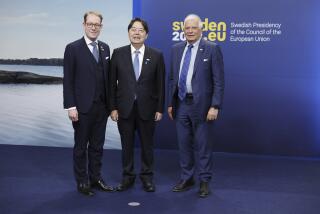Japan Faces Its Own Policy Gulf : Uproar over Kaifu’s proposal to dispatch forces
- Share via
Japan is obviously at a very difficult point in its postwar development as a world power. The Persian Gulf crisis has made these growing pains- cum -identity crisis all the more painful.
It’s not surprising that Prime Minister Toshiki Kaifu’s proposal to send self-defense forces out of the country for the first time in 45 years has produced an uproar. The proposed United Nations Peace Cooperation Law is now before the Diet, where it is encountering stiff challenges from opposition parties. The very thought of assisting--even in noncombat duties--in U.N. peacekeeping efforts in the gulf disturbs many Japanese. Tokyo has an opportunity now to demonstrate that it is, indeed, capable of defining and taking on for itself some new world responsibilities. Working under U.N. auspices provides Japan a legitimate and constitutional means to examine some fundamental issues confronting the country.
THE WORRY: Is Tokyo up to the challenge? Why is it that 45 years after the end of World War II, one of the world’s leading industrialized countries is still feared and mistrusted when it comes to the prospect of sending its self-defense force--unarmed, mind you--overseas? Does it have the political leadership to embark on what could be a turning point in its foreign policy? Or will it revert to its much-criticized status quo role on the sidelines?
Tokyo’s ability to tackle these issues will be closely monitored. Meanwhile, Japan’s Asian neighbors, haunted by its aggressions and atrocities during World War II, worry that Tokyo might become newly combative.
Such fears are exaggerated and provide Tokyo an easy justification for using pacifism as an excuse for inaction. Japan’s constitution, heavily influenced by the United States, forbids it from developing or deploying a military force except for self-defense. As a U.N. member, however, Tokyo has an obligation to cooperate in U.N. peacekeeping and security efforts.
THE APPROACH: Kaifu’s proposal limits the overseas use of self-defense personnel to U.N.-sanctioned activities and bars them from “the threat or use of force.” Their behind-the-lines tasks would include monitoring cease-fires and elections and providing telecommunications, maintenance, medical care, transportation and disaster relief. Kaifu’s government believes that such U.N. “collective security” efforts are within the constitution.
Even before the gulf crisis, Tokyo was moving gingerly to participate in some U.N. efforts. It sent civilians to help in Afghanistan, Namibia and Nicaragua. It was studying how to participate in Cambodia if a U.N. peacekeeping force goes there. But the Persian Gulf crisis has jolted Tokyo into deeper self-examination. Despite its $4 billion in non-military aid to the gulf effort, Tokyo has received a lot of criticism for practicing only checkbook diplomacy.
The U.N. peace cooperation bill will be a major test for Japan. Right now defeat looks likely in Parliament. That would be unfortunate. Tokyo needs a mature and modern approach to its world responsibilities. A defeat would be a setback to that effort.
More to Read
Sign up for Essential California
The most important California stories and recommendations in your inbox every morning.
You may occasionally receive promotional content from the Los Angeles Times.










